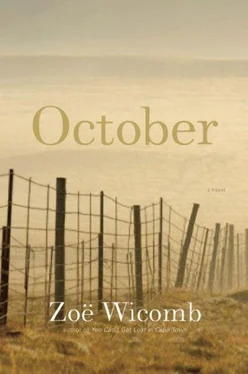The child quipped, Who needed kings? Perhaps kings, like merinos, were out of fashion. That’s why they didn’t have a king in South Africa. But Meester said that that was going too far, too immoderate. That a grand country like England had a queen. Which was altogether a different matter. The child could imagine being a queen with a shiny crown, one who would never make a mistake.
Sylvie would not for all the world miss the slaughtering of a sheep in Meester’s yard. Then she would hold one of the hind legs and watch him wield the sharp knife skillfully, score just beneath the skin, before kneading with a fist so that the flesh gave way cleanly, separating with a warm sighing sound from its skin. Meester said she could take home some intestines, trotters, and a couple of neck chops for her mothers, also fat for kaiings, all in exchange for scraping the stomach into clean tripe, and Ousie said that the Lord would bless Meester for his kindness.
Please, Sylvie begged AntieMa after school, please could she go with Meester and the boys to the veld, where they would gather melkbos for winter feed. She would take along a bag for collecting wood, and Ousie said yes, that it was good of Meester to take an interest in her. Perhaps he would help to put her through college one day. Yes, Sylvie said, echoing Meester, education was the only way out of backwardness. But Sylvie did not care about days in a distant future. Scampering into the world before sunrise, she loved each day as it broke in a rosy glow, loved being in the open veld with the vast blue dome overhead. She leapt with the boys onto the back of Meester’s bakkie, helped for a while with gathering and chopping melkbos, then would wander off looking for birds’ eggs, chasing after unfamiliar goggas, or sat stock still in the valleys, listening to strange animal cries cutting through the silence.
And as the girl grew hips and breasts under the old check shirt and cumbersome skirt, as she leapt tomboyish onto the back of the bakkie, AntieMa and Ousie and Nana did not think of protecting her against Meester, who after all was like a father to the child. Besides, they thought that the younger boys, Jakkie and Kytou, always went along, were picked up on the way. Had Sylvie not told them so? They did not imagine that alone, away in the secluded kloofs with only sheep to keep an eye, Meester might one day see that the child was no longer a child, that she had grown hips and breasts, and that perhaps she no longer wanted him as a father.
No, he was not her father. For Nicholas, the days of fathering were over, his children gone. He took her hand; he would show her a protected bower where the thorn trees clumped together on the bank of the dry riverbed. He told her to unbutton her shirt and free her new breasts, small as green apples. He spoke in a new voice, which the girl knew had grown deep and hoarse for her alone, of the beauty of the body, of her breasts. The delicious warmth of sin glowed purple through the dappled leaves, through the crown of thorns above, coursing through her new body.
Sylvie had been taught not to undress completely, to wash herself in AntieMa’s darkened room with a cloth and a basin of warm water, one part of the body at a time, the rest kept decently covered, and her skirt not to be removed at all. Under the trees with the dappled light on her breasts, she stretched out her arms and thrilled at the warm air lapping at her bare skin like so many tongues, thrilled at the pleasure of being looked at and admired. Meester said that God had made Eve to be adored and looked at by Adam in all her naked beauty, that there was nothing for Sylvie to fear.
It was Oom Hansie sawing under the thorn tree who put down his tools as Sylvie tried to slip by. He mumbled that it was too hot an afternoon for the veld, that she would be better off resting under the tree. It was hoeka time for coffee, could she not make him a mug of coffee? It was better for Meester to send a man to look for sheep; he, Oom Hansie, would be happy to go after they’d had a little chat over a mug of coffee. He had some ginger biscuits in his bag.
Sylvie laughed. Oom Hansie was an old man who hammered and sawed and dozed in the afternoons under the tree. Who did not talk. What did he know about sheep? No, she lied, she was waiting for Kytou and Jakkie; they would be branding the new lambs today.
Why, she asked her mothers, does Oom Hansie sit at their gate? Could they not tell him to go? Ousie said that there was no reason why he should not, that he worked with his hands, and actually it wasn’t their gate. The large old thorn tree belonged to everyone, and even if he were a foolish man, Sylvie should be careful not to be rude. Oom Hansie should always, at all times, be treated with obedience and respect. Meester agreed with Sylvie that Oom Hansie would not be able to run after sheep, and that the sheep would not respond to his call, as they did to hers, her magical tok-tok-tok which always made them turn their heads.
What else was there for Sylvie to do after school? Even the homework took her no time at all. The previous day part of the flock had not returned to the kraal and Meester relied on her to come along to find them. Then they would clip the ears of the new lambs, in case they strayed into the Boer’s adjoining camp. Oh, Sylvie ached to be alone in the veld with Meester, who said she was clever and beautiful. He knew everything about plants, about the red earth, the minimal variations in the vygies; he alerted her to the drones of insects, the paths washed by rare rainwater, the clouds in the sky with their fancy names.
Say after me, he said in English: cumulus, cirrus, stratus, and she said after him, as he stood behind her, his hands on her shoulders, steering her to the east. He relied on her sharp eyesight. There, he said, look to that ridge. Are those not sheep on the horizon? Then as she squinted into the sun, his hands slipped down onto the brand-new breasts. So that was what they were for. His fingers were like the tapered flutes of Jan Twakkie flower at the edge of the dry vlei, bright against the blue sky. And she loved his words, spoken like a dominee, hoarsely: I have come in sin. I must ask for forgiveness, but you are so beautiful, so very beautiful, and his voice, his body, trembled with appreciation for her. What did she care about silly old sin that AntieMa trotted out on Sundays? She had a new, quivering body and here was Meester, her very own father, dressed in sin, ready to attend to that body.
I am here for you alone, he said, and, steering her to their bower, unbuttoned her shirt, unbuttoned himself in the purple glow.
Sylvie could see no wrong in it. No, she was proud to have an admirer in Meester; she was his precious whom he would not hurt. Her pressed hair was nothing to him; he said she was beautiful and brave and clever; he cared about her purity; he would guard her, he said, with his life.
It was the meddling old man, Oom Hansie, who spoiled everything. Who knocked at the door and castigated AntieMa for her airs and graces and for allowing Meester to take advantage of the child. AntieMa, boiling with rage, ordered him off her premises, but when Sylvie came home she thrashed the girl, with the help of Nana, who held her arms pinned down. Sylvie would not confess to anything, but she was barred from going to the veld, and from that day her mothers kept a strict eye on her. But oh, she found ways of seeing him. She would walk miles, wait for him under the thorn trees with breasts bared in the purple light of sin.
Neither her mothers nor Oom Hansie said anything to Meester. Years later, Sylvie wondered why they hadn’t, why they assumed that it was her, the child’s responsibility.
It was Meester himself who, after many months of clandestine meetings in the veld, drove up alongside Sylvie one afternoon as she walked back from school. He sat stiffly in his seat, barely turning his head toward her to say that he had had a vision. He looked past her at the sky as if God were keeping an eye. God in all his glory, flanked by angels, had come to him in the night, spoken to him in a terrifying voice. They were not to meet again. Not ever again. God’s grace had thus far kept them out of trouble, but now He has spoken. She, Sylvie, should keep away from him, should no longer tempt him, lest her own soul be damned forever.
Читать дальше












